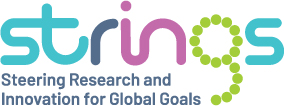Key messages
- The STRINGS projects’ unprecedented mapping of how different areas of STI relate to SDGs has highlighted the potential misalignments between countries’ research priorities and SDG challenges.
- The mapping and characterisation of published research also highlighted the stark inequalities between where the research capabilities are built and where they are most needed.
- During the side event, it was argued that funders, donors and international organisations should seek to steer research priorities to address this. Recommendations based on experiences in Brazil, Germany and South Africa were discussed.
- Measures that were discussed include: consulting with a wider range of stakeholders and reflecting the views of different communities across different contexts; improving the assessment of research’s (unequal) impact on societies; and introducing new forms of global governance to better analyse R&D allocations and STI strategies.
- STRINGS will publish a full report and recommendations from its research later this year You can receive regular updates on the project’s research and findings by joining the STRINGS mailing list.
Event summary
The STRINGS project’s side event at the UN STI Forum 2021 explored how policymakers, funders and international organisations can harness the power of science, technology and innovation (STI) for the Sustainable Development Goals.
Delivering the opening remarks, Dr Pedro Conceição, Director of the Human Development Report Office at the United Nations Development Programme, discussed the challenges and opportunities for advancement human development in the context of the Anthropocene, informed by the Human Development Report 2020. Pedro highlighted three roles for STI in achieving the SDGs: an instrumental role, helping to address concrete challenges like the Covid-19 pandemic; an enabling role, helping to understand the impact of new technologies and the relationships between economic, social and natural systems; and a constitutive role, helping to navigate the predicaments and challenges posed by the SDGs.
Prof Susan Cozzens, Professor Emerita in the School of Public Policy, Georgia Institute of Technology, gave a compelling keynote speech setting out the context within which efforts to align STI with SDGs take place. Susan highlighted vast inequalities, calling on those present to remember the very real way in which this affects lives, and setting out the need to rethink the relationship between our social, economic and political institutions, and the use of our human capacity to know.
Dr Tommaso Ciarli and Prof Joanna Chataway then presented findings and recommendations from STRINGS’ research. They highlighted the frequent misalignments which can hinder efforts to tackle SDG challenges at a global and national level and put forward a series of policy provocations. They called on STI funders and policymakers to consider questions like: Is enough resource going to SDG relevant STI? and Do we need a more systematic approach to gathering evidence about the relationship between research funding, innovation and development? Finally, they outlined STRINGS’ plans to publish an interactive online tool which researchers and policymakers will be able to use to contribute to interpreting STI’s potential contribution to the SDGs.
Following a short break, Prof Andy Stirling was joined by three prestigious panellists to discuss practical steps for steering STI to SDGs. Each of the speakers gave short remarks before engaging in an interactive discussion and Q&A.
Dr Glenda Kruss, Executive Head of the Centre for Science, Technology and Innovation Indicators (CeSTII) at the Human Sciences Research Council of South Africa, focussed on how to build capabilities for aligning STI to the SDGs. Glenda argued that we need greater participation at the local level by people who will be beneficiaries and users. She outlined CeSTII’s work to understand the interactive capabilities which formal knowledge producers and informal actors in local settings need to facilitate this kind of interaction and how these can be supported by research institutions, for example through engagement mechanisms like local science shops and community advisory boards.
In her remarks, Prof Elisa P. Reis, Vice-President of the International Science Council (ISC), considered how and where to start in this challenge. Elisa acknowledged the disparity in research resources between high-and low-income countries and that we must not forget that, even in low-income countries, objective research issues are not prioritised because the issues the international science system attributes importance to, do not align with the needs of poorer groups. Elisa argued that we must set research priorities globally, and channel material and human resources accordingly.
Dr Falk Schmidt, Scientific Head of the Coordination Office at the Institute for Advanced Sustainability Studies, shared insights from Germany’s Science Platform Sustainability 2030. The platform is a central hub where scientists and partners from politics, the economy and civil society can jointly reflect on pressing sustainability policy issues. Falk detailed the two-way exchange the platform facilitates. In one direction, by informing and supporting the development of sustainability policies. In the other, by steering and influencing research policy.
In the discussion that followed, speakers, panellists and guests exchanged views on how to navigate questions of power, privilege, creating capabilities, community engagement, availability of data and measuring impact.
Prof Sir Geoff Mulgan closed by talking about possibilities for new global governance to better align STI to the SDGs. Geoff pointed out the long history of opaque decision making in STI and set out four interlocking possibilities for addressing this: a global STI observatory, organised constellations of STI funders, pooled global budgets and convening and summits. Geoff noted that this is the beginning of a conversation rather than the end; we must continue this discussion to develop a global governance infrastructure that ensures STI focusses on the issues that really matter.

Leave A Comment